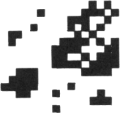Alpiner
| Alpiner | |
|---|---|
 Alpiner Manual (Front Cover) | |
| Publisher(s) | Texas Instruments (TI) |
| Original Retail Price | $39.95 (USD)[1] [2] |
| Programmer(s) | Janet Srimushnam |
| Part# | PHM 3056 |
| Format(s) | Solid State SoftwareTM Command Module |
| Release | 1982 (4th Quarter) [3] [4] |
| Genre(s) | Action |
Alpiner is an action video game designed by Janet Srimushnam for the TI-99/4A computer and published by Texas Instruments in the fourth quarter of 1982. It initially retailed for $39.95 (USD). Alpiner was released on Solid State SoftwareTM Command Module by Texas Instruments (TI). In the game, the player climbs the worlds six highest mountains while avoiding obstacles such as trees, animals (skunks, bears, cougars, snakes, vultures, and Yetis on skis) and falling rocks or landslides. The mountains in the game include Mount Hood, The Matterhorn, Mount Kenya, Mount McKinley (now known as Denali), Mount Garmo and Mount Everest. The names of the mountains along with their corresponding elevations appear on the main screen.
Contents
Sound
The game can be played with or without the commentary or voices, but to play with them requires the use of the TI Solid State Speech SynthesizerTM. The voices and commentary help to warn you of approaching obstacles and comment on your progress. Other sounds in the game, alert you to upcoming animals.
The music heard during gameplay is Anitra's Dance from Act IV of Peer Gynt by Norwegian composer Edvard Grieg.
Gameplay
After selecting 1-2 players and moving past the main screen with the mountains and elevations the game begins. The player must climb the side of each mountain and make it to the summit in the allotted time.
Obstacles placed in the Alpiner's way include falling rocks, wild animals, trees, and brush fires that must be avoided to continue up the mountain. In level 7 the avalanche obstacle is introduced and in level 13 the Ice Falls. Being hit by obstacles will result in sliding down the mountain, some further than others. If the Alpiner slides all the way down the mountain one of the lives is lost. The game awards an extra life after the end of each round of six mountains, after reaching the top of Mount Everest.
There are 18 levels in the game divided into 3 rounds, the player must climb each of the six mountains successfully to continue on to the next round.
A fully playable JacaScript version is available for play online at Bloberon: Alpiner.
Advertising Blurb
Front Cover of Manual
Climb six of the world's tallest mountains and evade dangerous obstacles with ALPINER. Be careful -- the Abominable Snowman is waiting for you atop Mt. Everest!
Cheat
Pressing the keys "*#*" (in that exact sequence) on the game's title screen, allows the player to choose how many lives he/she wishes to start the games with. The player can choose from 1 to 9 lives and the level of difficulty (from 1 to 18). Be aware, however, that enabling this cheat displays the word "Test" on the bottom left of the screen, so you won't fool your friends with the cheat enabled. [5]
Manual
ALPINERTM Cartridge Instructions TI-99/4A
Programmed by: Janet Srimushnam
Voices by: Aubree Anderson, Cliff Easthom
Book developed and written by: Staff members of Texas Instruments Creative Communications.
Copyright © 1982 by Texas Instruments Incorporated.
Solid State Cartridge program and data base contents copyright © 1982 by Texas Instruments Incorporated.
See important warranty information at back of book.
Introduction
You're struggling against two enemies: perilous obstacles and time. The mountain's summit is within your grasp. But watch out! A rockslide is heading straight for you! Can you move your Alpiner to safety in time?
Alpiner challenges you to climb the brutal terrain of six mountains filled with dangerous animals and falling hazards. As you climb onward and upward, you find that crafty wild animals which dwell in the mountain forests have crept onto the slopes, threatening not only your success, but your survival as well. While you must keep your Alpiner from touching these creatures, several of the mountain beasts tempt you with the possibility of making bonus points, requiring movements of phenomenal speed and accuracy from you.
Carefully, you continue forward. Suddenly, a rockslide appears out of nowhere! You've got to move fast to get out of danger. You're almost at the mountain peak-don't lose control now. You made it! But do you dare attempt to defy the next mountain's perils?
With the Alpiner Solid State Cartridge, each mountain you climb presents obstacles and hazards which must be met with speed, accuracy, and endurance. Some of Alpiner's features include:
- Obstacles in the form of wild animals and terrain.
- Falling hazards which you must avoid.
- Synthesized speech that warns you of imminent danger and comments on your performance.
- A wrap-around playing screen to increase your maneuvering capabilities.
- Daring tactics to obtain bonus points.
- Eighteen increasingly difficult levels of play to test your skills.
Alpiner is a one- or two-player game which requires speed and skillful manipulation. Movement of the Alpiner on the screen may be controlled by the arrow keys on the keyboard or by the Wired Remote Controllers (joysticks).
Alpiner is designed to work with or without the Texas Instruments Solid State SpeechTM Synthesizer (sold separately). However, the Speech Synthesizer must be attached to activate the voices of the Alpiner and the commentator. The voices enhance the game by warning you of approaching obstacles, commenting on your performance, and congratulating you for obtaining bonus points.
Getting Started
After you select the desired language version of Alpiner, the title screen appears. Press any key to leave the screen, or wait a few seconds and the title screen ends automatically and is replaced by another screen.
First, type either 1 or 2 for the number of players. Next, type the names of each player (up to 10 characters for each name), pressing ENTER after each name is typed.
Now the screen displays the names of the six mountains you must climb-Hood, Matterhorn, Kenya, McKinley, Garmo, Everest-and their respective elevations.
| Mountain | Elevation |
|---|---|
| Hood | 3427 M. |
| Matterhorn | 4477 M. |
| Kenya | 5193 M. |
| McKinley | 6194 M. |
| Garmo | 7495 M. |
| Everest | 8848 M. |
Directly beneath the mountain elevation chart, the command PRESS ANY KEY TO GO ON appears. Press a key and the game begins. Below the Alpiner figure on your screen is an information table. The table lists your current playing level, seconds allotted for the climb, the mountain you're presently climbing, and its height. Your CURRENT ELEVATION is displayed-this is updated as you climb.
To the right of your name are three black boots, indicating the number of Alpiners you have for the game in addition to the one on the screen. Your current score is recorded directly to the right of the Alpiners in reserve. At the bottom of the table either your HIGH SCORE, or in the two-player option, the second player's score is recorded.
Moving Your Alpiner
The movement of the Alpiner on the screen can be controlled either from the keyboard or by the Wired Remote Controllers. For convenience in two-player games, movement keys are designated both on the left and right sides of the keyboard.
| Left Side Keys | Right Side Keys | Action |
|---|---|---|
| (E) | (I) | Moves the Alpiner upward on the screen. |
| (W) | (U) | Moves the Alpiner diagonally upward to the left. |
| (R) | (O) | Moves the Alpiner diagonally upward to the right. |
| (S) | (J) | Moves the Alpiner left across the screen. |
| (D) | (K) | Moves the Alpiner right across the screen. |
| (X) | (M) | Moves the Alpiner downward on the screen. |
| (Z) | (N) | Moves the Alpiner diagonally downward to the left. |
| (C) | (,) | Moves the Alpiner diagonally downward to the right. |
If you are using the Wired Remote Controllers, eight directions are available also. Move the lever forward (toward the FIRE button) to make your Alpiner go up the mountain. Move the lever backward (away from the FIRE button) to make your Alpiner go down the mountain. Right and left movement is controlled by moving the lever in those directions. Control diagonal movement by moving the lever to the position that corresponds to the diagonal direction you desire for the Alpiner.
Playing the Game
With a watchful eye and a fast hand, you begin your climb on Mt. Hood (Level 1-you always begin playing on this mountain) by moving your Alpiner on the screen. Numerous wild animals inhabit the mountainous terrain that lies before you. Move past them quickly, for when the Alpiner is not in motion on the screen, you lose valuable time. In addition to these perils, you must always be on the alert for falling objects which could send your Alpiner plummeting down the mountainside.
Note: To learn more about the levels of game play, see the Levels of Game Play chart in the section "Advancing to Different Levels."
Watch Out!
A total of eleven obstacles in the form of trees, stumps, brush fires, and wild animals make your climb to the top of each mountain extremely dangerous. Warning tones sound to alert you when danger could be near.
You ascend 46 meters for each upward step your Alpiner takes. Bumping any obstacle, with the exception of the trees, makes your Alpiner fall back at least two steps. Each penalty step knocks you back 46 meters.
If your Alpiner falls down as a penalty for touching an obstacle, the Alpiner could hit another obstacle during this descent. When this occurs, your Alpiner falls all the way to the bottom of the mountain, and you will lose one Alpiner from your reserve.
Mountain Obstacles
The plant life of the mountains poses the initial threat to your climb. TREES which are scattered all over the mountainside inhibit the Alpiner's movement. Although there is no penalty for bumping into them, you must find a way around them. Bumping into tree STUMPS, however, costs you two steps (92 meters).
BRUSH FIRES are another concern, for they appear when you least expect them. If you go too close to the flames, your Alpiner falls back five steps.
The wild animals in the mountain forests threaten the survival of your Alpiner. They are a crafty lot, for you cannot predict where or when you'll run into them.
At lower mountain elevations, you encounter SKUNKS and SNAKES. The skunk is a dual threat-not only will touching it force you to fall two steps, but also, if you're caught in the skunk's line of fire, you'll go back two steps. Coiled, green rattlesnakes thoroughly infest the mountains. With venomous guile, they send you down three steps if you bump them.
As you climb higher, cunning black BEARS are waiting to knock your Alpiner back six full steps. Huge MOUNTAIN LIONS silently repose in their lairs, waiting to knock your Alpiner back seven steps if you accidentally disturb a resting cat.
Other mountain creatures venture out of the forests and onto the slopes at still higher elevations. BATS are a major obstacle to be avoided at this point. You can detect their presence by observing when their black, crescent-shaped caves appear. They fly out unexpectedly and make you descend five steps.
Scavenging VULTURES also loom ominously against the mountain peaks. You know you're in a vulture's territory when you have its nesting site in view. Only the foolhardy dare to tempt fate by going too near these nests, for the mother vulture jealously guards her infants, and she'll drop a rotten egg on you for disturbing her nest, causing you to fall eight steps!
Wild RAMS also await you near the mountain summits. These sure-footed climbers will zap you down nine steps if you accidentally run into them.
When you near the top of Mt. Everest, you come face to face with the most feared of all the mountain beasts-the ABOMINABLE SNOWMAN-on skis! Treacherous and fast, the SNOWMAN skis toward you and, in the blink of an eye, sends you crashing to the bottom of the mountain.
Note: With certain consoles, you may see the Alpiner figure momentarily flash on the left side of the screen just before falling. This does not affect game play.
Beware, Falling Objects!
Falling hazards strike terror in the heart of the bravest Alpiner. You must exercise maximum control to avoid being hit by these tumbling terrors-you'll drop to the bottom of the mountain if you're careless!
These falling objects consist of ROCKSLIDES, AVALANCHES, and ICEFALLS. Rockslides appear throughout lower levels of game play. Avalanches and icefalls occur at increasingly difficult levels of game play.
During lower levels of game play, each type of falling hazard descends at a different speed. Rockslides fall slower than avalanches, while icefalls are lightning-fast. However, at the highest levels of game play, all of these hazards may fall upon your Alpiner simultaneously, at any speed, and on any mountain.
You have been warned-these hazards are unpredictable, powerful, and menacing to the most skillful Alpiner!
Pausing During the Game
If you wish to stop the game temporarily, press the P or T key. Press any key to resume game play.
The Two-Player Option
If you select the two-player option, the game is played just as in the one-player option. Each player climbs a different side of the same mountain with similar obstacles for his or her turn. If one player uses all of his or her Alpiners, the surviving player continues the game until all Alpiners are lost.
Advancing to Different Levels
Alpiner has eighteen different levels of increasingly difficult game play to challenge you. The eighteen levels of play are divided into three rounds of six levels each. Each level corresponds to one of the six mountains you must climb.
| Levels of Game Play | |||||
|---|---|---|---|---|---|
| Mountain | Level in Each Round | Elevation | |||
| Round 1 | Round 2 | Round 3 | |||
| Hood | 1 | 7 | 13 | 3,427 M. | |
| Matterhorn | 2 | 8 | 14 | 4,477 M. | |
| Kenya | 3 | 9 | 15 | 5,193 M. | |
| McKinley | 4 | 10 | 16 | 6,194 M. | |
| Garmo | 5 | 11 | 17 | 7,495 M. | |
| Everest | 6 | 12 | 18 | 8,848 M. | |
Advanced levels of game play are similar to lower levels. After Level 6, all mountain obstacles may be encountered on any mountain. As previously discussed, there is a correlation between mountain elevation and the appearance of obstacles, and this factor remains the same throughout higher levels of Alpiner.
Climbing is much more difficult in Rounds Two and Three because the falling hazards descend more frequently and at higher speeds. At Level 7, you are met with a new falling object, the AVALANCHE, which descends at a faster speed than rockslides. Then, at Level 13 the barrage of incredibly fast ICEFALLS begins. Beware, for at mid-level game play in Round Two, the falling objects begin to aim straight for your Alpiner, requiring your utmost in skill to survive wave after wave of falling obstructions.
Scoring
Points are awarded for each upward step your Alpiner makes successfully. The point value for each step is relative to each particular mountain and your present level.
| Score Chart | |||
|---|---|---|---|
| Mountain | Round One | Round Two | Round Three |
| Levels 1-6 | Levels 7-12 | Levels 13-18 | |
| Hood | 10 | 20 | 30 |
| Matterhorn | 12 | 24 | 36 |
| Kenya | 15 | 30 | 45 |
| McKinley | 20 | 40 | 60 |
| Garmo | 25 | 50 | 75 |
| Everest | 30 | 60 | 90 |
Note: When your Alpiner falls to the bottom of a mountain for any reason, you do not accumulate points on your way back up that same mountain until you reach the altitude from which you fell on your previous climb.
Bonus Points
Bonuses for Beating the Clock
A bonus of twice the base points for each step is allowed for each second you have remaining on the time recorder when you reach the top of a mountain. For example, if you reach the top of Mt. McKinley in Round One with 10 seconds remaining on the time recorder, 400 bonus points are added to your score (20 x 10 x 2).
Note: Time allotted for your climb is not counted down except when the Alpiner is not moving. If, during game play, the Alpiner is not moving on the screen, seconds are lost which could be contributed toward bonus points. Therefore, plan your strategy as quickly as possible to avoid Losing valuable time.
If you fall to the bottom of a mountain and lose one Alpiner, the time recorder will be reset for the maximum time limit during your new Alpiner's attempt to climb the mountain from which you fell.
Time limits vary for each mountain, but as you advance to different levels, time limits shorten for each mountain. Therefore, it is much more difficult to obtain bonus points as you progress to different playing levels. As the chart below indicates, you've got to move faster to get bonus points!
| Time Limits | |||
|---|---|---|---|
| Mountain | Round One | Round Two | Round Three |
| Levels 1-6 | Levels 7-12 | Levels 13-18 | |
| Hood | 60 sec. | 45 sec. | 30 sec. |
| Matterhorn | 75 sec. | 60 sec. | 45 sec. |
| Kenya | 90 sec. | 75 sec. | 60 sec. |
| McKinley | 105 sec. | 90 sec. | 75 sec. |
| Garmo | 120 sec. | 105 sec. | 90 sec. |
| Everest | 135 sec. | 120 sec. | 105 seec. |
Target Bonuses
Bonus points are also awarded for touching the small green targets that flash periodically in the extended paws of the bears and mountain lions and the uplifted hooves of the rams. Caution: Hitting the target requires that you exercise an extraordinary amount of skill. You must dodge onslaughts of falling hazards while you position yourself for an accurate hit. If you miss the target and touch the animal's paw or hoof instead, you fall to the bottom of the mountain and lose one Alpiner.
A light touch is necessary to hit the target. If you hold the key down too long or the joystick lever in position too long, you may touch the target twice. In this case, you obtain bonus points, but you also fall the given number of penalty steps for the animal you touched. Keep in mind that during this penalty descent, you may bump another object and fall to the bottom of the mountain.
You're awarded a bonus of 500 points for hitting the bear's target, 750 points for the mountain lion's target, and 1000 bonus points for hitting the ram's target.
Note: If you fall to the bottom for any reason, you may try for the same target bonuses that you hit on your first ascent if you go back up the same mountain. You are awarded the same point value for hitting the target again.
New Alpiners
A new Alpiner is added to your reserve each time you complete a round of gameplay. Thus, you obtain a new Alpiner every time you reach the top of Mt. Everest.






